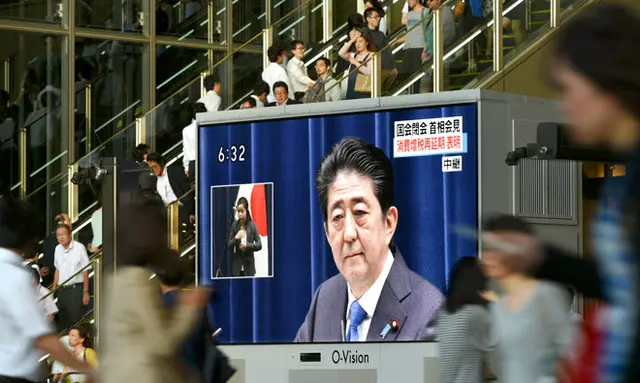Prime Minister Shinzo Abe’s second postponement of the consumption tax hike raises doubts not only about the credibility of his words but also the government’s commitment to repair its tattered fiscal condition.
These credibility issues are being voiced from both within Japan and abroad.
At a news conference June 1 to announce the delay in the tax hike to 10 percent scheduled for April 2017, Abe emphasized that the increase will happen in October 2019, adding, “I will never give up pursuing a sound fiscal condition (of the government).”
Revenue from the tax hike was deemed necessary not only to improve social security programs but also to reconstruct the fiscal situations of the central and local governments whose debts total more than 1,000 trillion yen (about $9.18 trillion).
Although Japan has issued a huge amount of government bonds, their prices have been stable largely because investors believed the Japanese government would be able to raise taxes.
Their expectations were well-founded.
When Abe announced the first postponement of the tax increase in November 2014, he clearly said, “I will never postpone the tax hike again.”
He also deleted from the law on the consumption tax increase a stipulation that said the government will take into account such factors as economic growth rates and price movements when it considers raising the tax rate.
That’s why officials of the Finance Ministry believed Abe’s words that he would never again delay the tax increase.
But the prime minister did.
With Abe reneging on his promise, the Japanese government’s credibility and willingness to increase taxes could be further called into question.
Abe also explained why he postponed the tax increase for as long as two-and-a-half years from April 2017.
He said it should be delayed as long as possible because it could take time for emerging economies, such as China, to recover. However, he also said he will firmly maintain his stance of achieving a primary balance surplus by fiscal 2020.
A primary balance surplus occurs when government revenues, excluding debts from the issuance of bonds, exceed the size of its policy-oriented expenditures.
Yet Abe still indicated he will implement large-scale pump-priming measures to shore up the economy. It is unclear how he can take such measures without exacerbating the Japanese government’s fiscal situation.
If the government puts off the goal of eliminating the primary balance deficit, it would effectively remove the one thing holding back a third postponement of the consumption tax rate hike.
Some business leaders have expressed anxieties over the repeated postponement of the tax increase.
“Unless the Japanese government can raise the consumption tax rate two-and-a-half years later, Japan will financially go bankrupt,” Akio Mimura, chairman of the Japan Chamber of Commerce and Industry, said on June 1.
“I want the Japanese government to say that it will implement the tax increase two-and-a-half years later under any economic circumstances without fail,” he said.
New York-based credit rating agency S&P Global Ratings said on June 1 that the second postponement in the tax hike would not affect its ratings of Japanese government bonds.
But Fitch Ratings, another major credit rating agency based in New York and London, said the postponement will injure the credibility of Japanese political promises to reconstruct the fiscal conditions.
The agency said it will decide on the rating of Japanese government bonds after checking the details of the government’s new plan for fiscal reform.
(THE ASAHI SHIMBUN)
 简体中文
简体中文

